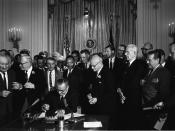In 1960, African-Americans enjoyed neither the economic nor the social standing of the rest of America. They had no access to high-level employment and received about two-thirds the pay of whites for doing the same work. Additionally, the small number of blacks attending colleges or universities lent little optimism for the future. Socially they fared no better. "Black only" restrooms, drinking fountains, and schools reflected the harsh reality that, in America, all men are not equal. Since the time of the founding fathers, this fact has haunted the American conscious, but has unfortunately, never been fully addressed. Finally, the old American policy of avoiding the race issue came to an end with the arrival of the civil-rights movement in the 1950s and 1960s, and for the first time, meaningful changes would be made towards the fulfilment of the truly democratic nation envisioned over two-hundred years ago. However, such a dynamic change would inevitably spark altercation and would not come easily.
Arguably the most significant reform of the civil-rights movement was brought by the Civil Rights Act of 1964 which inspired the highly controversial program known as "affirmative action," or the effort to provide qualified blacks with economic opportunities that legalized discrimination denied them. However, despite the simplicity of this definition, interpretations of the act's implications and the methods to be used in order to achieve its purpose have often conflicted. This paper will examine the arguments both of five scholars who support "affirmative action" as a necessary tool to "level the playing field" and reverse the social and economic misfortunes created from past discrimination, and the arguments of five scholars who find "affirmative action" unconstitutional, immoral, and detrimental to American society.
Wilbert Jenkins is a professor of history at Temple University who defends the reasons for "affirmative action" in a...


